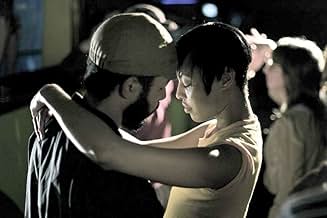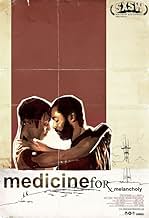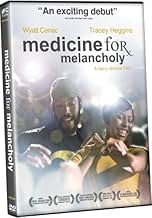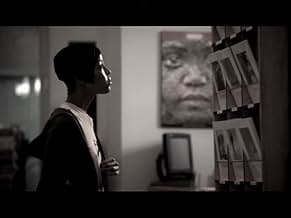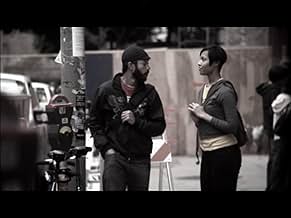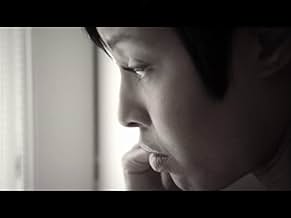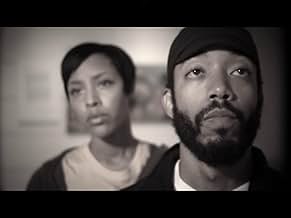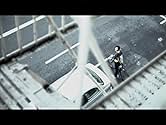IMDb RATING
6.6/10
2.9K
YOUR RATING
Twenty-four hours in the tentative relationship of two young San Franciscans also dealing with the conundrum of being a minority in a rapidly gentrifying city.Twenty-four hours in the tentative relationship of two young San Franciscans also dealing with the conundrum of being a minority in a rapidly gentrifying city.Twenty-four hours in the tentative relationship of two young San Franciscans also dealing with the conundrum of being a minority in a rapidly gentrifying city.
- Awards
- 2 wins & 10 nominations total
Melissa Bisagni
- Sierra Orneilias
- (as Melisa Bisagni)
Chida Emeka
- Hydration Hustler 1
- (as Chidi Emeka)
Ondine Kilker
- Ondine Kilcher - Housing Rights Meeting Attendee
- (as Ondine Kilcher)
- Director
- Writer
- All cast & crew
- Production, box office & more at IMDbPro
Featured reviews
First, a comment to the two reviewers who found this film 'slow,' etc;
The pace of films - for MOST of the 20th century were at a much slower pace. It lets the director get to know the characters, etc.
In today's film market - in which a HUGE part of the pie is overseas sales/distribution - dialogue doesn't translate, but, ACTIONS do.
That's one of the reasons why most films of the past decade or so, have interchangeable plots, characters - the story is second to the action.
Saying that, let me talk about MEDICINE FOR MELANCHOLY.
I came in a few minutes after it had begun. I'd never seen, nor heard of it (my friend had left the TV on, and was actually watching something prior - FLAWLESS, with R. DeNiro.
I came in when Micah was in a cab bringing the lost wallet he'd found back to it's owner, Jo (I know that they'd had casual sex just before this, and didn't know each other).
I got caught up in the dialogue. It was slow. It as natural, as to how two people meet (awkwardly) at inopportune times.
I quickly picked up on the ambivalence Jo' was having, and Micah, just trying (at first) to get to know Jo a bit.
The film follows them throughout that day - and that night, as the two start to reveal more of themselves. A third important cast member, who's very important, is the sprawling city of San Francisco.
I love the cinematography done on this film. It's a loving portrayal of San Francisco.
The pair walk through streets, and neighbourhoods, that are far from the shiny images tourists see, or think of, when they hear the city's name.
As for the performances of both the two (verbal) actors, I enjoyed their charisma, and I hope to see more from them in the future.
MEDICINE FOR MELANCHOLY is not for people who are impatient, or 'don't get' plots. But, for those who enjoy spending an afternoon, and just letting a film wash over you, this one's definitely one to watch.
The pace of films - for MOST of the 20th century were at a much slower pace. It lets the director get to know the characters, etc.
In today's film market - in which a HUGE part of the pie is overseas sales/distribution - dialogue doesn't translate, but, ACTIONS do.
That's one of the reasons why most films of the past decade or so, have interchangeable plots, characters - the story is second to the action.
Saying that, let me talk about MEDICINE FOR MELANCHOLY.
I came in a few minutes after it had begun. I'd never seen, nor heard of it (my friend had left the TV on, and was actually watching something prior - FLAWLESS, with R. DeNiro.
I came in when Micah was in a cab bringing the lost wallet he'd found back to it's owner, Jo (I know that they'd had casual sex just before this, and didn't know each other).
I got caught up in the dialogue. It was slow. It as natural, as to how two people meet (awkwardly) at inopportune times.
I quickly picked up on the ambivalence Jo' was having, and Micah, just trying (at first) to get to know Jo a bit.
The film follows them throughout that day - and that night, as the two start to reveal more of themselves. A third important cast member, who's very important, is the sprawling city of San Francisco.
I love the cinematography done on this film. It's a loving portrayal of San Francisco.
The pair walk through streets, and neighbourhoods, that are far from the shiny images tourists see, or think of, when they hear the city's name.
As for the performances of both the two (verbal) actors, I enjoyed their charisma, and I hope to see more from them in the future.
MEDICINE FOR MELANCHOLY is not for people who are impatient, or 'don't get' plots. But, for those who enjoy spending an afternoon, and just letting a film wash over you, this one's definitely one to watch.
It was lucky that I had a computer nearby so that I could read email while watching this movie. There is a kind of quirky genius to it and I did feel an intimate connection to the characters at times. It felt real and familiar, a little bit awkward to be seeing them so close and personal. In a way the extreme realness of the film was its downfall. Hitchcock once said something to the effect that films are like real life with the boring parts taken out. Too many of the boring parts were left in this film.
The cinematography is weak, but the use of muted colors matches the plodding dullness of the film, which may have been the intention. The music was a strong point, I thought -- it was different and original, fresh and creative.
The cinematography is weak, but the use of muted colors matches the plodding dullness of the film, which may have been the intention. The music was a strong point, I thought -- it was different and original, fresh and creative.
The premise of a man and woman rushing through all the phases of falling in love in one twenty-four hour period with the backdrop of a great city is a popular one. Nonetheless, it is a formula I never tire of, especially given the three main characters of "Medicine for Melancholy": Micah, Jo and the city of San Francisco. An awkward introduction in the light of day after a drunken one-night stand leads to an inauspicious "date" spent biking and cabbing around San Francisco. Unlike the relentless (but entertaining) dialogue of the Ethan Hawke and Julie Delpy characters in "Before Sunrise," or the charming tension between the mis-matched and ill-fated Audrey Hepburn and Gregory Peck in "Roman Holiday," the couple in "MFM" spend long moments of non-verbal connecting that is tinged by an overt sadness. This melancholy is confirmed by the sad dog eyes of Micah, the initially cold reaction of Jo and the lovely washed out hues of James Laxton's cinematography as he records the events of the single day shared by the couple. This movie is not driven by a narrative per se but by a series of moments that show a real emotional ballast many cinematic long-term relationships could not convey. Yet, the inevitability of the day's end and thus of the relationship's (mirrored by the fate of the city itself as it succumbs to a gentrified, character-less version of its fabled self), create a longing I felt hours after the movie ended. The soundtrack certainly contributed.
You couldn't make a movie that looks more like my day to day life in San Francisco than this. Telling the story of two black twenty-somethings who meet and have a one night stand, they start off the morning after in Bernal Heights, walk over to Noe Valley for breakfast, hop a cab to the Marina to drop her off, then he heads back to his studio on Geary at Hyde, two blocks from where I once rented a nearly identical apartment, down to the rotating walk-in closet door that once sported a Murphy bed. The couple meet again and head to the Museum of the African Diaspora on Mission and then over to Yerba Buena Gardens to ride the merry-go-round, both a block away from where I work. Later that night they buy stuff for dinner at Rainbow Grocery then head down to the Knockout to dance while my pal DJ Paul Paul spins 45s although his oldies singles are overdubbed on the film's soundtrack with obscure but cool indie rock. But aside from the pleasure of seeing all my usual haunts captured on on film, or digital video rather, Medicine For Melancholy is a smart movie that captures not only the vibe of life in downtown San Francisco, but also the subtleties of the changing ethnic and economic demographics of the second most expensive city in the country. The guy—played by Wyatt Cenac, an occasional correspondent on John Stewart's Daily Show—has a deadpan quarrelsomeness that is occasionally hilarious, because not only is he concerned about the ongoing disenfranchisement of the black community in the city, he's also bugged about the pending disenfranchisement of himself from the girl's pants once her live-in boyfriend returns to town. Her boyfriend, by the way, is white, which Cenac's character tries to elevate to a political issue because of his looming romantic frustration, but she's not having it, which leads to one of the film's best exchanges as they argue about the role race plays in forming their sense of self-identity. Lots of clever relationship stuff, like surreptitiously scoping out each other's MySpace profiles and sharp naturalistic dialogue as they continually negotiate and renegotiate the emotional boundaries and ending point of their one day affair. And maybe the scene with the housing activists meeting was a digression, but you know what, if you live here that stuff is very important and on everybody's mind, and it fits nicely given the context of the film whether you like it or not. Highly recommended.
I have no idea what these other reviewers are talking about. Usually these types of glowing reviews are sneaked in by people associated with the film to "prop it up" on the web. This is a painfully slow, bleak looking amateurish "student film" grade bore, topped with an implausible feeling. Forced, pretentious performances especially on the part of the girl played by the amateurish Tracey Heggins. I couldn't keep watching it after the first 10 minutes. I've seen too many of these where you're hoping against all hope that the film will get better - it doesn't 99% of the time so give it up now. I really can't understand what the fuss was about regarding this film on the festival circuit.
Did you know
- TriviaMade on a budget of $13,000.
- Crazy creditsEach song in the soundtrack appears in the credits with a still frame from the part of the movie where it was used.
- How long is Medicine for Melancholy?Powered by Alexa
Details
- Release date
- Country of origin
- Official site
- Language
- Also known as
- Remedio para melancólicos
- Filming locations
- Production companies
- See more company credits at IMDbPro
Box office
- Budget
- $13,000 (estimated)
- Gross US & Canada
- $111,551
- Opening weekend US & Canada
- $12,625
- Feb 1, 2009
- Gross worldwide
- $111,551
- Runtime
- 1h 28m(88 min)
- Color
- Aspect ratio
- 1.78 : 1
Contribute to this page
Suggest an edit or add missing content





